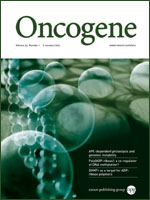 | |
| Discipline | Cancer biology |
|---|---|
| Language | English |
| Edited by | George Miller Justin Stebbing |
| Publication details | |
| History | 1987-present |
| Publisher | |
| Frequency | 50/year |
| 7.3 (2024) | |
| Standard abbreviations | |
| ISO 4 | Oncogene |
| Indexing | |
| CODEN | ONCNES |
| ISSN | 0950-9232 (print) 1476-5594 (web) |
| OCLC no. | 15797680 |
| Links | |
Oncogene is a peer-reviewed scientific journal published under the Springer Nature addressing cancer cell genetics and the structure and function of oncogenes. The journal has editorial office in London, England. The journal was established in 1987. [1] An open access online-only sister journal, Oncogenesis, was established in 2012 by Douglas R. Green, who was then Oncogene's editor-in-chief. [2]
Contents
Oncogene received a 2023 impact factor of 6.9 and received Journal Citation Reports rankings of 18th out of 191 in the category Genetics & Heredity, 29th out of 205 in the category Cell Biology, 32nd out of 313 in the category Biochemistry & Molecular Biology, and 43rd out of 322 journals in the category Oncology. [3]
The current editors-in-chief are George Miller and Justin Stebbing. [4]